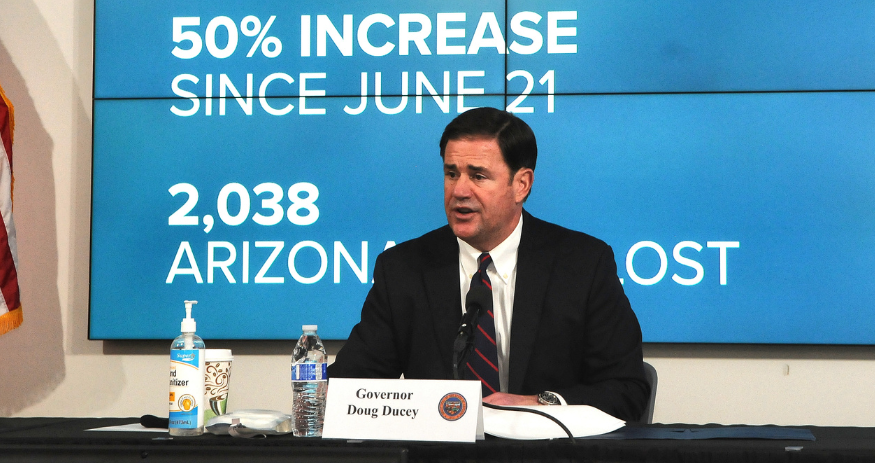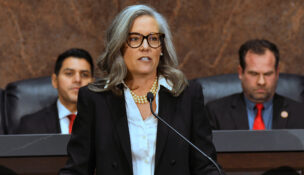Arizona voters to decide on new limits to Gov’s emergency powers
Howard Fischer, Capitol Media Services//September 23, 2024//[read_meter]
Arizona voters to decide on new limits to Gov’s emergency powers
Howard Fischer, Capitol Media Services//September 23, 2024//[read_meter]
PHOENIX – Arizona voters will have the chance to decide whether to put even more curbs on the emergency powers of whoever is governor.
Proposition 135 would not restrict the ability of any governor to declare an emergency. But what it would do is spell out that any emergency powers she or he assumes would self-destruct in 30 days unless both the House and Senate give approval.
It also allows lawmakers, even before the 30 days, to vote to end the emergency. That is reinforced by a provision that requires the governor, if the Legislature is not in session, to call them in if there is a petition with the signatures of at least one-third of the members of each chamber.
And the failure of lawmakers to approve an extension means the emergency goes away. And the proposal would bar the governor from proclaiming a new state of emergency for the same conditions.
The powers that existing law gives the governor are quite extensive.
It allows the governor to suspend any laws about the conduct of state business and any rules or regulations.
More sweeping is the power to “commandeer and use any property … or personnel deemed necessary in carrying out the responsibilities vested in the office.” The only exceptions are for firearms and ammunition. And then there’s the power to suspend or revoke any license held by a business.
How extensive is that?
Arizonans got a taste during the emergency declared in 2020 by then-Gov. Doug Ducey during the COVID outbreak. It included some an actual stay-at-home order.
While that was allowed to expire, others continued for longer.
There was an order that had shut down bars, gyms, theaters, water parks and even floating down a river in inner tubs. Ducey also limited restaurants to 50% capacity for dine-in service.
The governor said all that was necessary due to a spike in COVID cases that stretched the resources of doctors and the availability of protective equipment.
He even halted all elective surgeries and activated the National Guard to restock grocery store shelves.
And while Ducey declined to mandate the use of face masks, he gave the authority to do that to city, town and county officials.
All that led to the first effort by lawmakers in late 2020 to rein in the governor. Led by then-Sen. Michelle Ugenti-Rita, it would have allowed the Legislature to declare the emergency is over.
It got no traction.
A bill finally was enacted in 2022. Also crafted by Ugenti-Rita, it limits public health emergencies to just 30 days, allowing for up to three automatic extensions.
At 120 days the emergency self-destructs absent House and Senate approval. And those renewals are good for only 30 days.
Of note is that Ducey agreed to sign it under the condition that it would not take effect until 2023 – after he left office. That is the law that now governs the actions of Katie Hobbs.
Rep. Joseph Chaplik, however, doesn’t think that’s enough.
The problem, according to the Scottsdale Republican, is there are gaps.
It starts, he said, with the fact that the limits on powers in the existing law apply only to public health emergencies. Proposition 135 covers everything except a state of war or any emergency arising from a fire or flood.
Chaplik also said the limit of an emergency to just 30 days without legislative approval is more appropriate than the existing law that allows one to continue for up to 150 days.
Most significant potentially is the requirement for the governor to call lawmakers back as soon as a third of senators and representatives demand it. Now it takes two thirds, something difficult in a divided Legislature.
“Under Prop 135, the legislature could call a special session on Day One if a governor abuses their emergency power,” he told Capitol Media Services.
In fact, Chaplik noted, it would give lawmakers a range of options.
Yes, they could pull the plug entirely on the emergency. But what they also could do is set specific limits on the scope of the emergency.
That issue came up last time as lawmakers called for Ducey to cancel the COVID emergency. The governor refused, arguing that, if nothing else, that state of emergency was necessary to continue receiving federal COVID funds.
Under Proposition 135, Chaplik said, lawmakers could extend the emergency, but with guardrails, saying, for example, it is only for the purpose of accepting certain federal dollars, and only for the purpose of spending those dollars for specific reasons.
And there’s something else: Proposition 135 would amend the Arizona Constitution, something that could be altered only on a future public vote. The current restrictions are statutory and could be changed by a future Legislature, either with permission of the governor or, with a two-third vote, over his or her objections in an override.
“Prop 135 answers fundamental questions about function of government and separation of powers which belongs in the constitution, not in statute,” he said.
Not everyone is as enthusiastic about the proposal at Chaplik.
“Voting for this would add bureaucratic red tape and delay Arizona’s emergency response,” said Will Humble. The former state health director, now executive director of the Arizona Public Health Association, had a particular problem with that 30-day limit on emergencies.
“The purpose of any state emergency declaration is to allow state agencies to implement reasonable measures to help quickly respond to disasters,” he said. “When people and communities are in a state of emergency, the last thing they need to do is wait for the Legislature to come to a consensus.”
Pinny Sheoran, president of the League of Women Voters of Arizona, said provisions that allow lawmakers to “dilute the governor’s emergency powers … would undermine the governor’s ability to effectively manage ongoing crisis situations.”
But Scot Mussi, president of the Arizona Free Enterprise Club called Prop 135 “an appropriate balance” of the need for quick action and legislative oversight.
“This ensures an on-going emergency and the great power being put into the hands of one politician is affirmed by more than just that person,” he said. “If these powers are abused or the nature of the emergency changes, the Legislature may also limit or alter the powers being granted.”


















